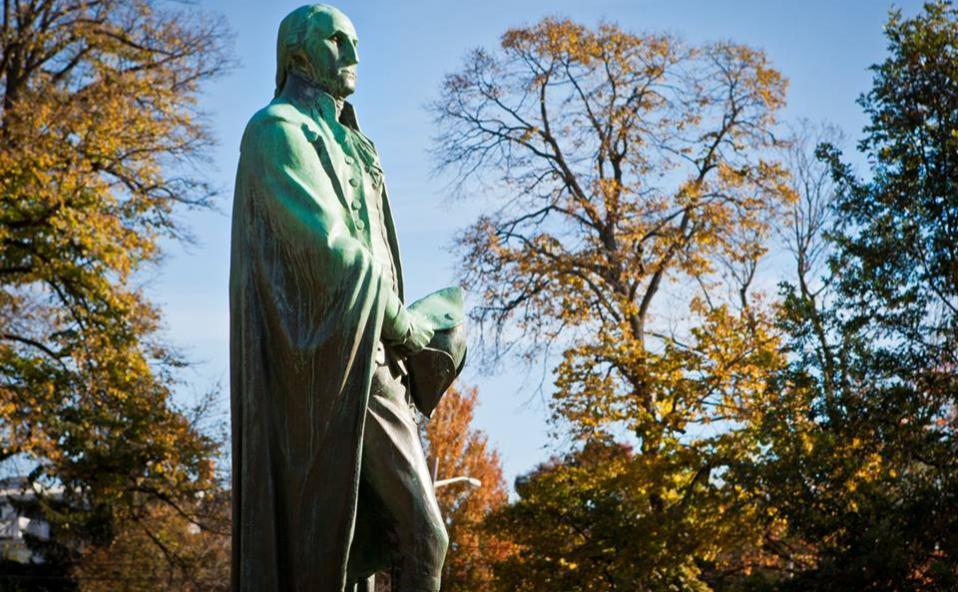Washington College has received a grant of $126,000 from The Teagle Foundation to help fund its Visions of Freedom in America program for area high-school students. The three-year grant supports weeks-long seminars on campus, with a special focus on enrolling students from under-resourced communities and will enable participants to visit key historical and cultural sites throughout three states and the District of Columbia. With this grant support, the Visions of Freedom in America program at Washington College becomes part of The Teagle Foundation’s Knowledge for Freedom network, which includes programs at Boston College, Columbia University, Dickinson College, Fordham University, Stony Brook University, Ursinus College, Villanova University, and Yale University.
Visions of Freedom in America: A Knowledge for Freedom Program is an educational and mentoring program for high-school students, primarily in Dorchester County, with historically limited opportunities to attend college. The program, co-directed by Joseph Prud’homme, director of the Institute for the Study of Religion, Politics, and Culture (IRPC) at Washington College, and Charles Lamont Pinkett, pupil personnel specialist at Dorchester County Public Schools—a leader in the county branch of the NAACP’s Maryland conference, and recipient of the Martin Luther King Image Award—explores the writings and personal leadership of seminal champions of human liberty while mentoring students for future collegiate success and opening doors to internships.
“We are grateful to The Teagle Foundation for this exciting opportunity,” said Washington College President Michael J. Sosulski. “The Visions of Freedom in America: A Knowledge for Freedom Program introduces students to great written works that have expanded freedoms and transformed our world. This experience can empower young people to assume positions of civic and community leadership.”
Anticipated to expand across the region, Visions of Freedom showcases the contributions of leading women and men in the building of a free and just society. Seizing on its notable location at the heart of the Underground Railroad on Maryland’s Eastern Shore, as well as its proximity to the cradle of American constitutionalism in Philadelphia, the seat of federal government in Washington, D.C., and the diverse communities of Baltimore, the program offers participants opportunities to connect with leaders in government, think tanks, museums, community organizations, and places of worship. They also learn from scholars at Washington College and from universities and colleges across the nation who come to campus to assist with instruction.
Last summer, Visions of Freedom students participated in a college-level seminar to discuss excerpts from Plato’s “Republic,” the Declaration of Independence and the Constitution, the Federalist Papers, the collected speeches of Abraham Lincoln, and the writings of Martin Luther King Jr. Guest speakers included Jahkari Taylor, African American scholar and educational reform leader; Washington College Provost Michael Harvey, an expert on leadership studies; and the head of the Kent County Maryland NAACP, the Rev. Charles Tilghman. While on campus, the students also received extensive guidance and mentoring from officers of the College’s Office of Admissions and Financial Aid.
Visions of Freedom participants continue to gather for enrichment activities after they complete the summer program. The group reassembled on Martin Luther King Jr. Day in January for an instructional tour of the Maryland and Delaware segments of the Underground Railroad and other historic centers of African American culture on the Delmarva Peninsula, including the Harriett Tubman National Park and Museum and the birthplace of Frederick Douglass. They took a field trip to Washington, D.C., the following day.
“As each new group starts the program, were main in close contact with the students in previous groups as they enter the colleges of their choice,” said Prud’homme.“The overarching goal of our programming is to craft a deep and meaningful engagement with these young people, to forge a long-term mentoring relationship driven by a sincere desire to stay in touch with participants for the rest of their lives, which we strongly believe is critical to achieving the most impactful educational results.”
The IRPC at Washington College inspires young thinkers of all backgrounds to explore the first principles of a free society and the enduring value of core texts and concepts that have enriched the human experience. It is dedicated to the rigorous study of religion’s influence on American and world history and its contemporary importance for cultural and political life. The Institute also explores a range of pressing issues facing contemporary society and the enduring value of America’s founding principles.
Headquartered in New York City, The Teagle Foundation works to support and strengthen liberal arts education, which it sees as fundamental to meaningful work, effective citizenship, and a fulfilling life. The Foundation’s aim is to serve as a catalyst for the improvement of teaching and learning in the arts and sciences while addressing issues of financial sustainability and accountability in higher education.
Founded in 1782, Washington College is the nation’s first liberal arts institution and the tenth oldest college in the nation. Enrolling approximately 1,000 undergraduates from more than 35 states and a dozen nations, Washington is known for outstanding academics with an emphasis on hands-on, experiential learning across more than 40 multidisciplinary areas of study. The College is home to nationally recognized academic centers in the environment, writing and American history. In addition to its main campus in Chestertown, Maryland, Washington College also features a riverfront campus and a 5,000-acre river and field campus that provides unique research opportunities for students and faculty.



Write a Letter to the Editor on this Article
We encourage readers to offer their point of view on this article by submitting the following form. Editing is sometimes necessary and is done at the discretion of the editorial staff.